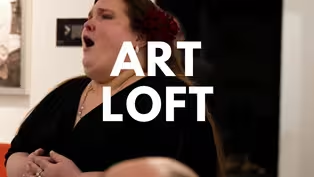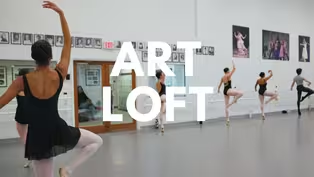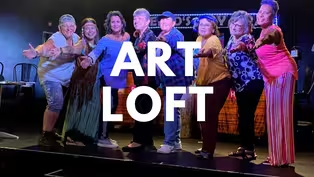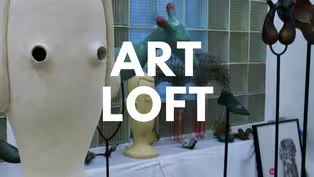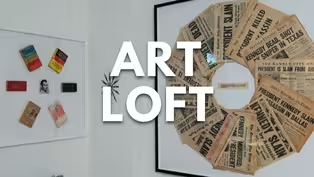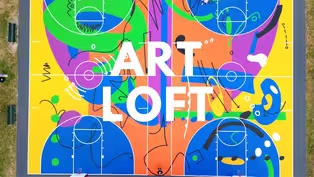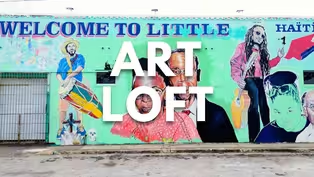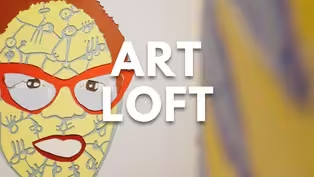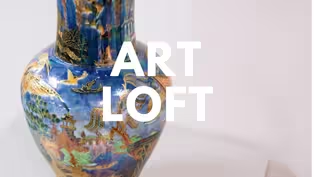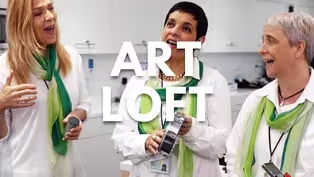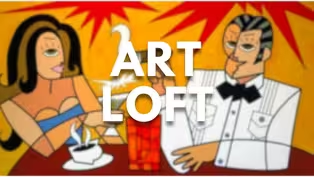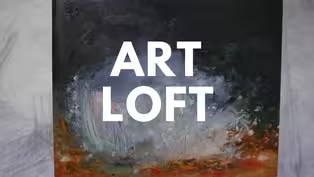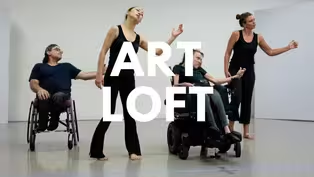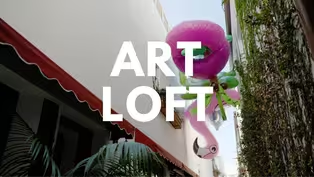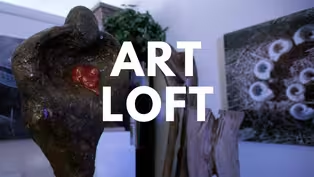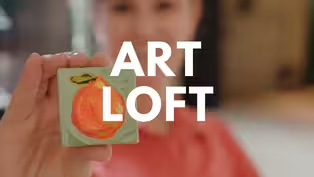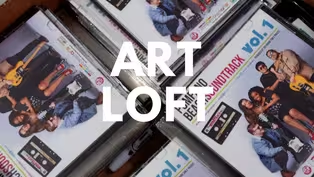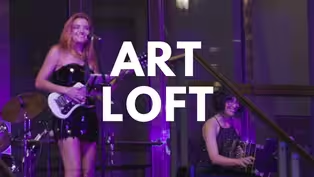
Rosie Gordon-Wallace
Clip: Season 13 | 14m 36sVideo has Closed Captions
Rosie Gordon-Wallace has long been recognized a community leader and arts advocate.
Rosie Gordon-Wallace has long been recognized a community leader and arts advocate. Here, she shares about the journey of starting the Diaspora Vibe Cultural Arts Incubator (DVCAI), what’s next for the organization, and the role of art in community.
Problems playing video? | Closed Captioning Feedback
Problems playing video? | Closed Captioning Feedback
Art Loft is a local public television program presented by WPBT
Funding for Art Loft is made possible through a generous grant from the Monroe County Tourist Development Council.

Rosie Gordon-Wallace
Clip: Season 13 | 14m 36sVideo has Closed Captions
Rosie Gordon-Wallace has long been recognized a community leader and arts advocate. Here, she shares about the journey of starting the Diaspora Vibe Cultural Arts Incubator (DVCAI), what’s next for the organization, and the role of art in community.
Problems playing video? | Closed Captioning Feedback
How to Watch Art Loft
Art Loft is available to stream on pbs.org and the free PBS App, available on iPhone, Apple TV, Android TV, Android smartphones, Amazon Fire TV, Amazon Fire Tablet, Roku, Samsung Smart TV, and Vizio.
Providing Support for PBS.org
Learn Moreabout PBS online sponsorshipI want to explain that there is a bubbling sense of urgency in my body to get this work done, and it has been there for a long time, it didn't just happen as I get older.
Because there are so many on earthed artists with talent, and I know talent is not the only thing, but there are ones that have real talent that have not been identified, they have accidentally been ignored.
In a purposeful programmatic way, Diaspora Vibe Cultural Arts Incubator is determined to continue to seek funding and for artists to go away, leave their environment, leave their loved ones, and go away and pay attention to themselves.
I'm Rosie Gordon-Wallace, president and curator of Diaspora Vibe Cultural Arts Incubator, an incubator space in Miami that primarily works with Caribbean artists.
I came to America fully baked as an adult, I studied medical microbiology.
And the incubator incubation process in microbiology is everything, you know, we take one day old shakes, we do our viral cells.
It is a part of the practice.
So, the incubation, and everybody's an incubator now, you see it in all of the news spaces.
But for me, it is really an, not only an informed practice, it is a daily practice of taking care.
The nurture and the rest has been a part of my life from the very beginning.
We started at the Bakos in 1996, and the start was predicated because many of my peers whose children had gone off to the major art schools, Parsons, RISD, you know them, had no return to Miami with the notion that they could walk to a gallery with a portfolio and hand it in and that they would get called for a show.
No, that's not how it works.
And so, this group of young artists were getting really discouraged that they weren't being seen by the major galleries.
And I basically said, let's stop complaining and do something about it.
There was no business plan, we just started meeting and decided that we're going to do an exhibition.
You know, in 2024, everybody's talking about community, right?
How we're getting in, how we're supporting each other.
In the Caribbean community, in the black and brown community, in the cultural community, community is everything.
It is akin to safety, it is akin to where when things are not going right, you can go for support.
So, we created it without even having a name for it.
Folks would come to the Bakos and hang out with us here and hang out with the artists there just because they knew we were there.
You know, you don't have to call to make an appointment, making an appointment formalizes a process, but going to a community space opens the door.
So, there's a little nuance in there between feeling safe and wanted.
You know, we, I go into a room and I know that I'm not accepted, no one has to say, you can't come.
The room has a feel, room has a vibe.
In community spaces, you go in, you step into a Puerto Rican space, you step into a Nicaraguan space and you feel a sense of community regardless of whether you speak the language or you're from that culture.
So, it matters in how the work gets produced and it matters in how people mature over time.
You also have to have bright people around you, intelligent people, folks with vision and talent.
But in truth, and in fact, you also have to be curious and seek wisdom.
This nonprofit system has been around for a long time, and we are newcomers to the system.
And I've had many folks in the system who have been kind in pointing the way, you know?
There's a way, there's a way, you know, you say it in the, you repeat it because there is a way.
You have to read the instructions, you have to follow the instruction.
No one cares what you think, you have to follow the instruction.
And so, that has been my task in adding maturity to Diaspora Vibe Cultural Arts Incubator.
I took it on, and as a scientist, it was a challenge that I embraced primarily because no one talked about the archive piece, no one talked about the documentation piece, no one talked about making sure that when you meet an artist for a studio visit, that that is documented.
That each practice, each activity is important.
We have been doing that for 28 years, asking the questions about grandparents.
We have oral histories, we have digital histories of the time.
And so, a little bit of that, I accredit to my formal training.
But it's hard, it's hard.
And the system is not flexible.
You are a part of the system and you drive on that highway and take on all of the facets of the system as well.
The institutions, the museums have a particular role to play.
They are assigned or unassigned, the validating piece of an artist's career.
You have a solo in a museum, it is a validating action.
However, the community activists, the people doing work in the community that are aligned and assigned to the artists are the ones that bring the memory, right?
So, the museums wait for us to nurture and work and promote, and then they come in and snatch.
I will use the word snatch, snatch in a good way.
Snatch is not always bad.
And we want that to happen.
When we talk about, when I look at a CV of an artist and I say, let's see what's, let's diagnose this.
What's missing?
You haven't done any residences.
Have you gone here?
Have you had a studio visit?
Has a curator come?
Do you have a scholar writing on your work?
All of these things are things that the museums want, because when we do the work, when I send an artist to a museum for solo show, and that work has been done, that archive has been full, all they have to do now is put on lipstick.
The artist that I work with will tell you I'm very careful about mental health and health.
If you are a leader of an organization, you have to think about what care looks like.
And care means for me, time that is unassigned.
It's like you get an unrestricted grant.
When I ask for a grant to send artist to Suriname for a month, I'm not asking them to go to work.
I'm saying, how can a new country with multiple cultures inform and allow you to think differently in your practice?
How can you wake up with not an assignment, you know, assigned for the day?
What does that look like?
And that is a practice of care, that is a practice where most of the artists the first week don't know what to do.
They're completely uncomfortable with having unassigned time where they're not getting up to do work.
I see the change, I can make a case about impact.
And I know that when we teach that practice by doing, the artist is a better person for it, having gone through it.
I am genuinely, deeply concerned about my peers, which were few in the beginning.
When we had the recession, the recession that was named 2008, many of our arts organizations closed and never reopened.
There's a thing about closing that other artists will tell you, I resist closing.
When COVID came, we said, we're too small to stop.
We'll put on our mask, but we're gonna keep doing the work.
Our neighbors, our community needs this work.
So I am, I'm anxious, I am concerned.
What I think we have to do is pivot.
This powerful exhibition curated by none other than Rosie Gordon-Wallace.
Collaboration is not a noun, it is a verb.
And we have to collaborate from a, not a place of scarcity, but a place of abundance.
Collaboration has actions and it has consequences, and it has, it builds trust, and it means that your benefit may not happen at the same time.
That's true collaboration.
[Interviewer] If you could go back in time and give your younger self advice, what would you say to yourself?
I would say, be bolder.
I would say, be reckless.
I would say, be less respectful.
You know, we have been brought up to be, to cross your legs, sit up, be respectful, and it doesn't necessarily get you to where you wanna get to.
There is respect without being nervous and afraid.
I would also say that the work that you're embarking on is important work.
I didn't think it was important work, I just think it was work that was passion-driven.
I look back now and if I had defined it as important work, not only would I have continued to document it, I would've documented it in a different way.
I was catching the stories, putting them down, I was archiving because that's my practice.
But looking back, I could have done it in a different way.
And that's not a regret, it's something that I would do.
But what I would much rather do is look into the future.
The next chapter is embedded in succession.
The next chapter is walking away from fear of 30 years of work, meaning fear in passing it on, being able to leave the kitchen with a stove turned down and the pots on top of the stove.
That's where I am.
I am preparing, we have, thanks to the Mellon Foundation, we have been given support and for, and I have to say, Miami-Dade Department of Cultural Affairs, they have been our parents throughout this journey.
We could not have gotten this far.
But in terms of succession, having an executive director, Tanya Desdunes.
Having two dance provide catalyst fellows, being able to say to them, you take care of the archive, make sure it's digitized, make sure it gets to the right place.
I can't teach you everything, but there are fundamental administrative roads.
Having Gordon step forward and say, "I would like to lead, I'm not good at doing the admin," so we're gonna have to surround him with admin.
And embedding what legacy is, this is legacy work, it's my life, you know?
And, but I'm not afraid.
I'm not going to die at my desk.
I'm go die, but I'm not gonna die at my desk, even if I have to get up and then die.
I want to have a plan in place that has an endowment so that in the next 20, 30 years when my dopey comes back, Diaspora Vibe is running and thriving, and that artists have a place to come and do their work.
We cannot all close, we have to invest in the next generation.
And I'm hoping that the next generation can catch some of this passion that continues to curdle and churn inside of me, because the work is so worthy and the artists are so undervalued for what they bring to the stories and the joy that they bring to our lives.
We started the organization around our dining room table, and it's really been about family and it's really been about that there's always enough room, and even with limited resources, like we always find the time, the effort, to kind of make it happen.
I am so happy to see you all.
Just turn around and look at each other.
Just look, look at who is beside you, look at the feeling.
Can you feel the vibe in the room?
[Audience] Yes.
Can I get a round of applause for the vibe?
I'm at the very beginning of institution building, an opportunity at Mary University, with embedded in the library.
So, the physical space in the library.
The institutional economic conversations have just started, but my dream is to embed Diaspora Vibe Cultural Arts Incubator as an institute with probably immigration studies at the university so that we can co-program with the art department, with students that come from areas that we know.
I wanna have a big party in 2026 as I plan to step aside, it is a fact.
And if I'm alive, because you know, many of us didn't make it this year.
If I'm alive in 2026, I will have a different song to sing, but it'll be a gleeful song embedded in 30 years of joy.
Lauren Frick: Bringing Opera to New Audiences & Helping to Shape its Future
Video has Closed Captions
Clip: S13 | 7m 29s | Lauren Frick wants to make opera accessible and engaging for audiences of all ages. (7m 29s)
Inside NSAL Florida’s Ballet Competition Empowering Young Artists
Video has Closed Captions
Clip: S13 | 12m 10s | The National Society of Arts and Letters is dedicated to supporting young artists. (12m 10s)
Finding Community on the Stage with Lesbian Thespians
Video has Closed Captions
Clip: S13 | 6m 8s | Lesbian Thespians is a local non-profit performing arts community founded and led by women. (6m 8s)
Exploring a Wonderland of Uncanny Art with Artist Jeanne Jaffe
Video has Closed Captions
Clip: S13 | 10m 47s | Jeanne Jaffe is a multifaceted artist based in Miami, whose work explores themes of identity. (10m 47s)
Dennis Scholl Sparks Collective Memory with Assemblage
Video has Closed Captions
Clip: S13 | 8m 51s | Dennis Scholl is an artist and filmmaker whose work revolves around collective memory. (8m 51s)
Transforming a Miami Basketball Court Into a Work of Art
Video has Closed Captions
Clip: S13 | 7m 2s | Artist Najja Moon’s practice centers on collaborative community experiences. (7m 2s)
Serge Toussaint & Little Haiti Street Art
Video has Closed Captions
Clip: S13 | 9m 58s | Serge Toussaint is an artist whose murals adorn many buildings in Little Haiti. (9m 58s)
Video has Closed Captions
Clip: S13 | 14m 36s | Rosie Gordon-Wallace has long been recognized a community leader and arts advocate. (14m 36s)
The Wiener Museum of Decorative Arts WMODA
Video has Closed Captions
Clip: S13 | 10m 50s | The Wiener Museum of Decorative Arts is a museum that celebrates the fired arts in South Florida. (10m 50s)
Brazilian Voices Brings Bossa Nova to Hospitals
Video has Closed Captions
Clip: S13 | 8m 16s | Brazilian Voices is an award-winning non-profit female vocal group based in South Florida. (8m 16s)
Miami Artist Carlos Navarro Blends Pop Culture & Cuban Culture
Video has Closed Captions
Clip: S13 | 7m 28s | Carlos Navarro is a pop artist who blends themes of nostalgia with imagery inspired by Cuba & Miami. (7m 28s)
Explore Loss, Grief, and Healing with Visual Artist Ema Ri
Video has Closed Captions
Clip: S13 | 11m 57s | Join an open studio with visual artist, Ema Ri. (11m 57s)
Explore Physically Integrated Dance with Karen Peterson and Dancers
Video has Closed Captions
Clip: S13 | 6m 4s | Enter the rehearsal room with dance company, Karen Peterson and Dancers (KPD). (6m 4s)
Temporary Public Art Take Over Hotels for “No Vacancy, Miami Beach”
Video has Closed Captions
Clip: S13 | 7m 40s | Art transforms some of Miami Beach’s most iconic places with “No Vacancy.” (7m 40s)
Artist George Gadson and the arts as ministry
Video has Closed Captions
Clip: S13 | 8m 14s | George Gadson's odyssey from being trained as a theologian to becoming an artist. (8m 14s)
Affordable Local Art From a Vending Machine: Flamango Vending
Video has Closed Captions
Clip: S13 | 2m 8s | Repurposed snack vending machines are stocked with affordable mini masterpieces from artists. (2m 8s)
Pompano Beach Soundtrack Vol. 1
Video has Closed Captions
Clip: S13 | 10m 27s | The City of Pompano Beach has a soundtrack created with local talent. (10m 27s)
Video has Closed Captions
Clip: S13 | 5m 30s | A modern spin on tango with Electro Dub Tango. (5m 30s)
Providing Support for PBS.org
Learn Moreabout PBS online sponsorshipSupport for PBS provided by:
Art Loft is a local public television program presented by WPBT
Funding for Art Loft is made possible through a generous grant from the Monroe County Tourist Development Council.
